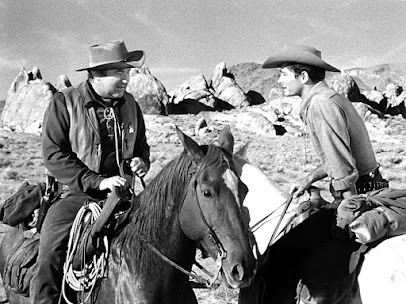Review: The Last Posse (1953)
Every single time that I watch a western from the 1950s, I feel like I've enjoyed a four-course meal. This genre in this era is one of the most consistently-rewarding in all of cinema for me, featuring stories built around multi-layered characters with real and relatable human foibles, aspirations, and the kind of details that make them feel three dimensional.
Broderick Crawford delivers a stellar performance as an alcoholic lawman that's so frequently in his cups that he can barely stand on his feet, let alone dispense justice. Eight years ago, he rid his streets of a gang of outlaws, but his history of violence and the crimes he couldn't stop have left a lasting mark on his conscience. When the bank robbery occurs, the posse rides out without him and is surprised when he suddenly catches up to them. What role could this worn out drunk possibly serve, and why is he so determined to ride along on this last posse?
As is the case with pretty much all studio pictures from the era, the film is character actor heaven. In addition to Crawford, the cast includes John Derek, Charles Bickford, Wanda Hendrix, Will Wright, and the Werewolf of London himself, Henry Hull. Each character feels substantial enough that one gets the feeling the focus could shift to any of them and we'd willingly follow. Interestingly, the film was sold in Sweden as Six Men Came Back, which speaks to the importance of the ensemble.
The screenplay comes from Kenneth Gamet (based on a story by Seymour Bennett and Connie Lee) who wrote a whole slew of oaters in the forties and fifties such as The Doolins of Oklahoma, Santa Fe, Man in the Saddle and The Stranger Wore a Gun, among many others, often starring Randolph Scott but also Audie Murphy and Buster Crabbe. He gives us incredible lines that feel authentic and as if they're drawn from experience. Consider this gem from beside the campfire: "A sheriff's got no friends. Just a job." This line is adapted into the film's poster, which proclaims "When six guns spoke the law--a sheriff had no friends!" When someone tells Crawford to forget about the past and focus on the job at hand, he replies "There are some things you can't forget, no matter how hard you try. They just keep growing in you."
The directing duty is handled by Alfred L. Werker, a name noir fans will know from the excellent crime film He Walked By Night, though I should also reference his work on The Adventures of Sherlock Holmes, the second of fourteen Basil Rathbone/Nigel Bruce Sherlock pictures. Werker uses the familiar Hollywood western landscape of Lone Pine, California to great effect, making this B-movie feel like much more than it is. That's really the secret here: what this film lacks in budget (most of the music is recycled from Columbia serials) it more than makes up for with rich characters and compelling storytelling. While the studios were paying attention to the expensive A-pictures, the B-teams consistently churned out mature, layered stories filled with complex themes and real human drama, all crafted on a shoestring. The running time of The Last Posse is a mere 73 minutes and not a single moment is wasted or unnecessary.
Since it's a Columbia picture, the film is part of Sony's catalog now and has never been given a proper, pressed disc presentation stateside, though an MOD version does exist. Both standard and HD versions are available for digital purchase, but physical media fans will want to seek out the region free Australian DVD from Umbrella Entertainment's Six Shooter Classics series. No special features are included, but the transfer is solid and comes directly from Sony.






Comments
Post a Comment